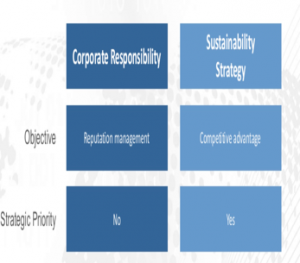Michael Porter weighs in on CSR with co-author, Mark Kramer in their Harvard Business Review article, Strategy & Society, The Link Between Competitive Advantage and Corporate Social Responsibility. The report is available for download here. A must read for both CSR and sustainability advocates.
Overall, I see throughout the article the view of corporations as individuals, a giant organism, positing these giant organisms have “self-interest.” And what’s missing? According to Porter it’s metrics to keep the organism on track, understanding the organism is “not responsible for all the world’s problems,” deriving, as it does, from the goal of “contributing to a prosperous economy (and he adds) a truth governments and NGO’s often forget…” I’m sorry but this is a view I cannot share based on my experience and knowledge. For strategy to work your view individually and collectively has to be right on so read Mr. Porter with a critical eye.
MY CRITICAL EYE
Porter View One: Social responsibility is a subset of sustainability
 Accepting a narrow view of sustainability reinforces a more hardware, technological response to solving problems. The article correctly references the more environmental and community stewardship aspects of sustainability adopted by many corporations. Yet the authors cite, as supportive of these aspects, the 1980’s Brundtland Commission broad definition used by the World Business Council for Sustainability Development: “meeting the needs of the present without comprising their own needs.” This goal doesn’t place an emphasis on environment and stewardship, but corporations do, and the effect is to sideline the economic, social and cultural aspects of sustainability. What’s sidelined? Social justice, externalizing risk and costs, and greenhouse gas emissions are three examples kept off many a corporate agenda and, even more importantly, off the CEOs agenda. One of the findings by the consulting firm, McKinsey (February 2010), is sustainability has to be on the CEO’s agenda – one of the top three priorities – placing the responsibility where it belongs and pointing up the role of personal responsibility, a different view.
Accepting a narrow view of sustainability reinforces a more hardware, technological response to solving problems. The article correctly references the more environmental and community stewardship aspects of sustainability adopted by many corporations. Yet the authors cite, as supportive of these aspects, the 1980’s Brundtland Commission broad definition used by the World Business Council for Sustainability Development: “meeting the needs of the present without comprising their own needs.” This goal doesn’t place an emphasis on environment and stewardship, but corporations do, and the effect is to sideline the economic, social and cultural aspects of sustainability. What’s sidelined? Social justice, externalizing risk and costs, and greenhouse gas emissions are three examples kept off many a corporate agenda and, even more importantly, off the CEOs agenda. One of the findings by the consulting firm, McKinsey (February 2010), is sustainability has to be on the CEO’s agenda – one of the top three priorities – placing the responsibility where it belongs and pointing up the role of personal responsibility, a different view.
Porter View Two: Sustainability is a subset of CSR, part of the THAT family.
CSR and sustainability are mixed throughout the article, making sustainability a subset of CSR and then pointing to the fragmentation of CSR as being a “tremendous lost opportunity” reducing the ability of corporations to create social benefits. Within the corporate organism, the two are rarely mixed up* being functionally distinct. The best comparison of the two is provided by David Metcalfe, CEO of Verdantix and a refreshing alternative to Porter’s view two. Porter is right about loosing a competitive advantage, but it’s not because CSR is out of whack.
Here’s a quick look at part of the comparison. Click on best comparison to see the entire chart. A different view.
Why is the view so important?
It’s easy to loose not only your money,but your soul in the process of implementing a strategy with a dysfunctional view. “The moral calculus needed to weigh one social benefit against another, or against its financial costs, has yet to be developed.” I don’t think I need to add anything to this observation, but…the actor in this statemen t (not fact) is again the corporation, the result indirectly being a blessing of the practice of externalizing morality and consciousness and giving credence to vapid statements such as “moral principles do not tell a pharmaceutical company how to…” in the Harvard Business Review, no less. This view is part of the free market paradigm, enriched with psuedo psychology, but not spiritually in books such as Ayn Rand’s Atlas Shrugged, “The incomparable novel about the men of the mind on strike against the creed of self-sacrifice.”
t (not fact) is again the corporation, the result indirectly being a blessing of the practice of externalizing morality and consciousness and giving credence to vapid statements such as “moral principles do not tell a pharmaceutical company how to…” in the Harvard Business Review, no less. This view is part of the free market paradigm, enriched with psuedo psychology, but not spiritually in books such as Ayn Rand’s Atlas Shrugged, “The incomparable novel about the men of the mind on strike against the creed of self-sacrifice.”
The conclusion of this view is that our society does need a moral compass, but it needs to be invented, then mounted on the corporate dashboard, freeing individuals from being held accountable for their actions, many of which may also be illegal. Sharif Abdullah provides excellent direction in this regard as he discusses in his video, Criminality and Morality, the economics of it all and an alternative view that should be informing strategic thinking these days, a different view.
It reminded me of a recent article in the New Yorker where the author observed that women do calculus and the men arithmetic when it comes relationships and love. Surely you’ve been in at least one meeting where the “metrics” just didn’t add up.
So, according to Porter here’s what we need to do:
![]() How about a corporate agenda that address the planet, people, and prosperity elements of sustainability (Triple Bottom Line) with a view that puts responsibility on the officers and employees of a corporation for any harm done.
How about a corporate agenda that address the planet, people, and prosperity elements of sustainability (Triple Bottom Line) with a view that puts responsibility on the officers and employees of a corporation for any harm done.
Ruth Ann
* There are VPs of CSR/Sustainability at companies such as Campbell Soup, but it would take more information to know who one reports to and what is the primary objective.

Pingback: Update on Strategy & Society: Abolish Corporate Personhood | sustainability advocate